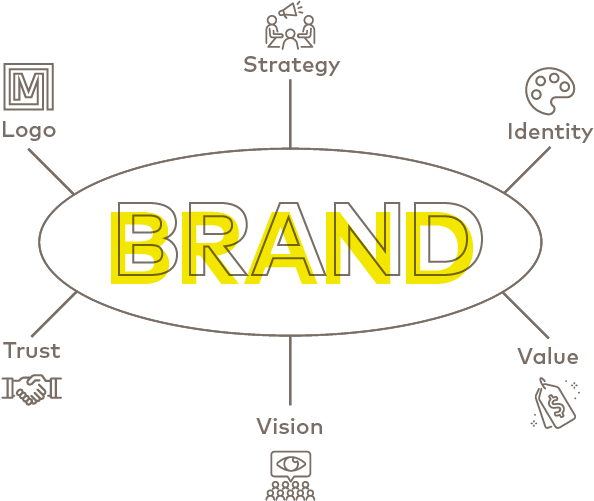Exactly How to Create Robust Branding That Resonates with Your Target Market
Exactly How to Create Robust Branding That Resonates with Your Target Market
Blog Article
Why Robust Branding Is Vital for Market Management
In today's affordable landscape, robust branding arises as a critical component for achieving market management. A well-defined brand identity not just sets a firm apart from its rivals but also cultivates count on and emotional links with customers. These components are crucial for cultivating commitment and motivating repeat organization, yet several organizations neglect the much deeper ramifications of their branding techniques. As we check out the complex nature of branding, it comes to be evident that the risks are high for those who fail to acknowledge its significance in shaping lasting organization success. What are the specific techniques that can elevate a brand name to this well-regarded standing?
Recognizing Brand Name Identity
Consistently recognizing the value of brand identity is essential for any kind of organization aspiring to achieve market management. Brand identification encompasses the aesthetic aspects, messaging, and overall assumption that identify a business from its rivals. It functions as a structure for exactly how consumers regard and connect with a brand name, playing a vital duty in forming their experiences and assumptions.
A well-defined brand name identification communicates the core worths and goal of a company, creating a psychological connection with its target market. Components such as logo designs, color pattern, typography, and intonation have to align cohesively to communicate a regular message throughout all platforms. This consistency strengthens brand name recognition and fosters client commitment.
Moreover, brand identity is not simply surface; it mirrors the authenticity and stability of a business. It needs to be carefully crafted to resonate with the designated audience while staying versatile to advancing market trends. Organizations that prioritize a strong brand name identification can efficiently distinguish themselves, construct a favorable credibility, and cultivate a dedicated client base. Eventually, a robust brand identification is essential for navigating competitive landscapes and sustaining long-term success.
Building Customer Trust
A solid brand name identification prepares for building customer trust fund, a vital element in achieving market leadership. Trust fund is not simply an emotional response; it is a critical possession that can substantially influence purchasing choices and brand name loyalty. Companies that cultivate transparency, reliability, and consistency in their messaging and actions promote a complacency among customers.
To develop this count on, brands have to supply on their pledges. This means ensuring that product quality satisfies consumer expectations which solution experiences are favorable and receptive. Constant interaction enhances dependability; when customers know what to anticipate and that their problems will certainly be dealt with, their confidence in the brand strengthens.
Social proof also plays a crucial duty in establishing trust fund. Positive reviews, endorsements, and endorsements from reputable resources improve a brand name's track record and can persuade potential clients. Involving with consumers through social systems and resolving their problems openly shows liability and dedication.
Differentiation in Competitive Markets
In today's crowded marketplace, distinction is vital for brands seeking to stand apart and catch consumer attention. With countless alternatives available, customers are often overloaded, making it essential for brands to establish an unique identification browse around here that reverberates with their target market. This distinction can materialize with different aspects, including product functions, prices methods, customer care, and brand messaging.
Reliable differentiation includes not just identifying what makes a brand one-of-a-kind but additionally interacting these differences clearly and constantly. Brand names must verbalize their worth recommendation in such a way that addresses certain consumer requirements and preferences. For instance, a business might concentrate on sustainability, cutting-edge modern technology, or individualized client experiences to carve out a niche in a competitive landscape.
Additionally, brand names must constantly evaluate their affordable atmosphere to adapt and improve their differentiation techniques. This proactive strategy makes sure that they remain enticing and pertinent to consumers as market dynamics advance. Eventually, robust branding that stresses differentiation not only fosters brand name commitment but also positions a company as a leader in its sector, leading the way for sustained development and market prominence.
Emotional Links With Consumers
Psychological connections offer as a powerful stimulant in structure long lasting partnerships between brands and customers. It fosters loyalty that goes beyond mere transactional communications when customers reverberate with a brand on a psychological level. Brands that efficiently evoke emotions-- whether via storytelling, shared worths, or genuine interaction-- produce a feeling of belonging for their clients.
These emotional ties can substantially influence buying decisions, as consumers are often driven by feelings as opposed to logic. A brand that aligns with clients' addresses or goals their pain points can cultivate an ingrained loyalty that results in repeat business and positive word-of-mouth references.
Moreover, psychological branding permits business to distinguish themselves in congested markets. By using the sentiments of their target audience, brand names can take an one-of-a-kind identification that reverberates deeply, making them unforgettable and liked over rivals.
In an age where customers are pounded with selections, a solid emotional connection can be the choosing consider brand name preference. Thus, focusing on emotional interaction is not merely a marketing technique; it is Get the facts a calculated critical for brand names looking for to establish meaningful relationships and boost customer retention.
Long-Term Company Success
Lasting organization development rests on the capability to grow robust branding methods that resonate with consumers in time. A strong brand not only sets apart a firm from its rivals however additionally promotes commitment and depend on amongst customers. This lasting connection is important for making certain repeat company, which considerably adds to profits stability and development.
In a significantly competitive marketplace, brand names that interact a consistent and clear message are more probable to flourish. This consistency strengthens brand identity, making it much easier for consumers to choose the brand name and remember over others. Robust Branding. Therefore, a well-established brand name can adjust to this link market adjustments without losing its core significance, permitting innovation without pushing away faithful customers
Additionally, robust branding creates a system for customer interaction, wherein services can collect comments and adjust their offerings appropriately. This iterative procedure not just enhances customer contentment but likewise develops a community around the brand, fostering a sense of belonging.
Conclusion

Organizations that focus on a strong brand identification can successfully differentiate themselves, construct a positive reputation, and grow a devoted client base.A strong brand identity lays the groundwork for developing consumer depend on, an essential component in achieving market leadership. A solid brand name not just differentiates a company from its competitors but likewise fosters loyalty and trust fund among customers. As an outcome, a well-established brand name can adapt to market changes without shedding its core significance, allowing for technology without pushing away loyal customers.

Report this page